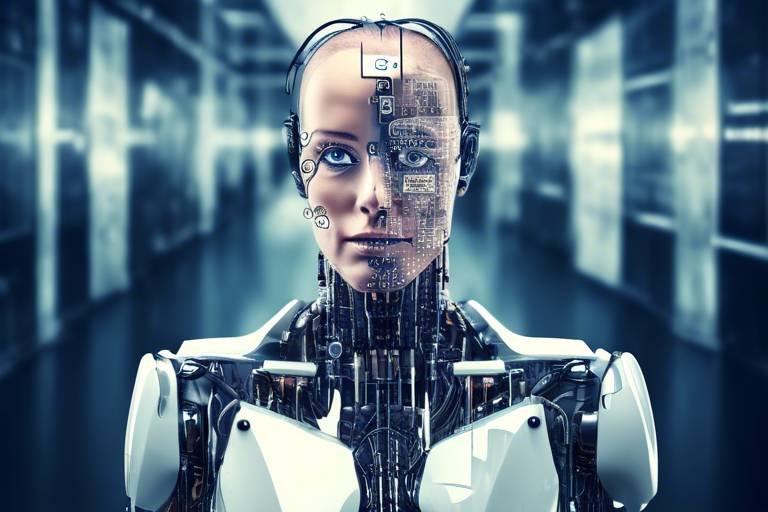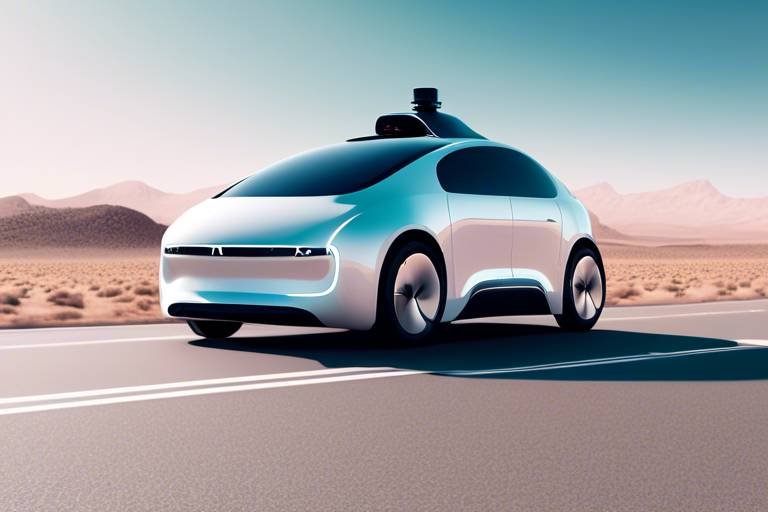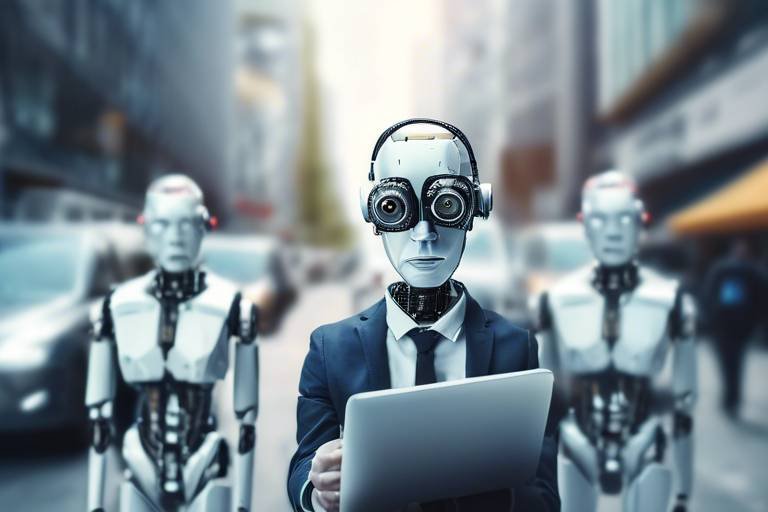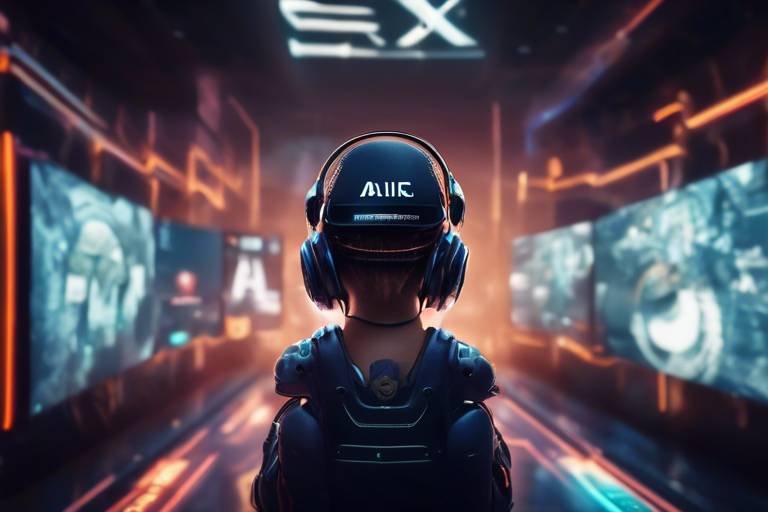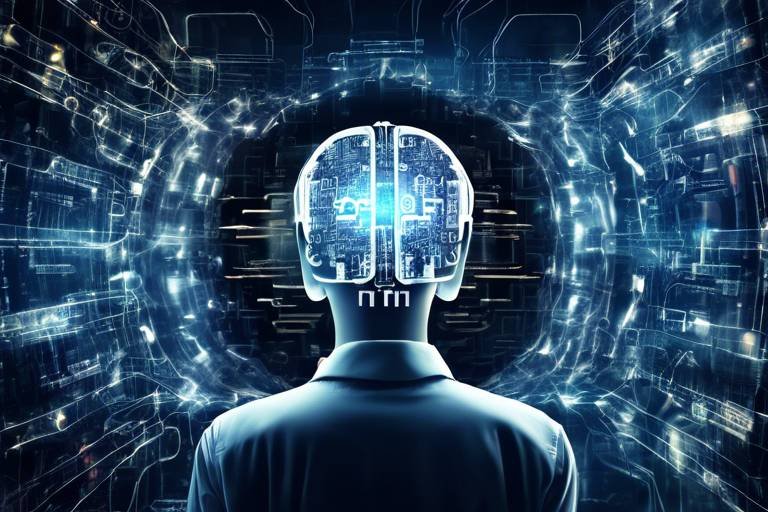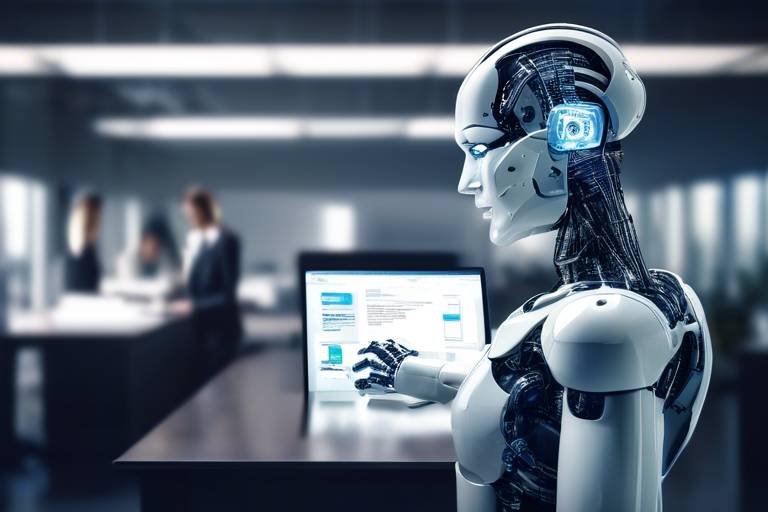Artificial Intelligence: Reinventing Recruitment
In today's fast-paced world, artificial intelligence (AI) is no longer just a futuristic concept; it has become a cornerstone of modern recruitment strategies. Imagine a world where hiring processes are not only faster but also smarter—this is the reality that AI is creating. Recruitment, traditionally a labor-intensive and often biased process, is being transformed into a streamlined, efficient, and more equitable experience for both employers and candidates. With AI at the helm, organizations are discovering innovative ways to enhance their hiring practices, making them more effective and less prone to human error.
The integration of AI into recruitment is akin to upgrading from a flip phone to a smartphone. Just as smartphones revolutionized communication, AI is reshaping how companies find and engage with talent. From automating mundane tasks to analyzing vast amounts of data, AI tools are designed to assist recruiters in making informed decisions while improving the overall candidate experience. This shift is not merely about efficiency; it's about creating a recruitment landscape that is fair, transparent, and tailored to meet the needs of diverse candidates.
As we delve deeper into this transformation, it’s essential to recognize the various facets of AI's impact on recruitment. From enhancing candidate experience through personalized interactions to reducing bias by focusing on qualifications rather than demographics, AI is paving the way for a more inclusive hiring environment. Organizations that embrace these technologies are not just staying competitive—they are also setting new standards for what effective recruitment looks like in the 21st century.
However, with great power comes great responsibility. As we explore the benefits of AI in recruitment, we must also address the challenges and ethical considerations that accompany its implementation. How can organizations ensure that their AI systems are fair and transparent? What measures can be taken to protect candidate data? These are critical questions that need to be answered as we navigate this evolving landscape.
In the following sections, we will explore the rise of AI in recruitment, its benefits, challenges, and future trends. We'll uncover how AI is not just a tool but a game changer that is redefining the very essence of hiring. So, buckle up as we embark on this exciting journey through the world of AI in recruitment!
Discover the growing trend of AI adoption in recruitment, including its impact on efficiency and the changing dynamics of the hiring process in various industries.
Explore the numerous advantages AI brings to recruitment, such as reduced bias, improved candidate matching, and streamlined processes that save time and resources for employers.
Learn how AI-driven tools create a more engaging and personalized experience for candidates, from initial contact to onboarding, ultimately leading to higher satisfaction and retention rates.
Examine the role of chatbots and virtual assistants in answering candidate queries and facilitating communication, making the recruitment process more accessible and efficient.
Understand how AI-powered assessments help evaluate candidates' skills and cultural fit more accurately, providing insights beyond traditional resumes and interviews.
Investigate how AI can help mitigate unconscious bias in hiring processes, promoting diversity and inclusion by focusing on candidates' qualifications rather than demographic factors.
Identify the potential challenges organizations face when integrating AI into their recruitment strategies, including data privacy concerns, algorithmic bias, and the need for human oversight.
Delve into the ethical implications of using AI in recruitment, discussing fairness, transparency, and accountability in automated decision-making processes.
Speculate on the future of AI in recruitment, including advancements in technology and how organizations can leverage these innovations to stay competitive in the talent market.
- What is AI in recruitment? AI in recruitment refers to the use of artificial intelligence technologies to enhance and streamline the hiring process.
- How does AI improve candidate experience? AI improves candidate experience by providing personalized interactions, timely communication, and efficient processes.
- Can AI reduce bias in hiring? Yes, AI can reduce bias by focusing on qualifications and skills rather than demographic factors, promoting a more diverse workforce.
- What are the challenges of using AI in recruitment? Challenges include data privacy concerns, algorithmic bias, and the need for human oversight in decision-making.
- What is the future of AI in recruitment? The future of AI in recruitment includes advancements in technology that will further enhance efficiency, transparency, and inclusivity in the hiring process.

The Rise of AI in Recruitment
Artificial Intelligence (AI) is not just a buzzword anymore; it’s a game-changer in the recruitment landscape. Picture this: a world where hiring is not only faster but also smarter. This is the reality we are stepping into as AI technologies become more integrated into recruitment processes across various industries. From tech startups to established corporations, organizations are realizing that leveraging AI can significantly enhance their hiring strategies.
The trend of AI adoption in recruitment is rapidly gaining momentum, and for good reason. Traditional hiring methods often involve tedious processes, manual resume screening, and endless rounds of interviews, which can lead to inefficiencies and poor candidate experiences. But with AI, companies are discovering that they can streamline these processes, making them more efficient and effective. Imagine a system that can sift through thousands of resumes in seconds, identifying the best candidates based on specific criteria. This is not science fiction; it’s happening right now.
Moreover, the changing dynamics of the hiring process are evident. AI tools are not just about speed; they also enhance the quality of hires. By utilizing machine learning algorithms, these tools can analyze vast amounts of data to identify patterns and trends that human recruiters might miss. This capability allows organizations to make more informed decisions, ensuring they select candidates who not only possess the necessary skills but also fit well within the company culture.
As we delve deeper into this AI revolution, it's essential to recognize the various sectors that are embracing these technologies. For instance, the healthcare industry is utilizing AI to find qualified medical professionals, while the retail sector is enhancing its customer service teams with the right talent. The versatility of AI applications in recruitment is astounding, as it adapts to the unique needs of different industries.
However, it's not just about the technology itself; it's also about the impact on the workforce. With AI taking over repetitive tasks, human recruiters can focus on what they do best—connecting with candidates and building relationships. This shift allows for a more personalized approach, which is crucial in today’s job market where candidates seek meaningful interactions and experiences.
In summary, the rise of AI in recruitment is transforming the way organizations approach hiring. By enhancing efficiency and improving candidate experiences, AI is not just a tool but a vital partner in the recruitment process. As we continue to explore the benefits and challenges of this technology, one thing is clear: the future of recruitment is bright, and AI is leading the way.

Benefits of AI in Hiring
Artificial Intelligence (AI) is revolutionizing the way organizations approach hiring, bringing a plethora of benefits that enhance the overall recruitment process. One of the most significant advantages is the reduction of bias. Traditional hiring methods can often be swayed by unconscious biases, leading to less diverse workplaces. However, AI tools can analyze candidate qualifications without being influenced by demographic factors, ensuring that the best candidates are selected based solely on their skills and experiences.
Moreover, AI improves the candidate matching process. By utilizing sophisticated algorithms, AI can sift through vast amounts of data to identify candidates who not only meet the job requirements but also align with the company culture. This level of precision in matching candidates to roles can drastically reduce the time spent on recruitment, allowing hiring managers to focus on more strategic tasks. With AI, organizations can achieve a more efficient hiring process, which is a win-win for both employers and candidates.
Another remarkable benefit of AI in hiring is the streamlining of processes. Traditional recruitment can be time-consuming, often involving multiple rounds of interviews and extensive paperwork. AI can automate many of these tasks, such as resume screening and scheduling interviews. For instance, a study revealed that companies using AI-driven tools could reduce their time-to-hire by up to 50%. This efficiency not only saves time but also cuts down operational costs significantly.
Additionally, AI-driven recruitment tools enhance the candidate experience. From the initial application to onboarding, candidates today expect a seamless experience. AI can facilitate this by providing personalized communication and timely updates throughout the hiring process. Imagine applying for a job and receiving instant feedback or answers to your queries through a chatbot. This level of engagement not only keeps candidates informed but also fosters a positive impression of the company, enhancing their overall experience.
To summarize, the benefits of integrating AI into hiring processes are numerous and impactful. Here’s a quick overview:
| Benefit | Description |
|---|---|
| Reduced Bias | AI minimizes unconscious bias, promoting diversity and inclusion. |
| Improved Candidate Matching | AI algorithms identify candidates that fit both job requirements and company culture. |
| Streamlined Processes | Automation of tasks like resume screening and interview scheduling saves time and resources. |
| Enhanced Candidate Experience | AI provides personalized communication, improving candidate engagement and satisfaction. |
In conclusion, the integration of AI in hiring processes not only enhances efficiency but also fosters a more equitable and engaging recruitment experience. As organizations continue to adapt to this technology, the recruitment landscape will undoubtedly evolve, paving the way for a brighter and more inclusive future in hiring.
- How does AI reduce bias in recruitment?
AI systems analyze candidate qualifications based on data rather than demographic factors, which helps to minimize unconscious bias. - Can AI improve the candidate experience?
Yes, AI tools provide timely updates and personalized communication, making the recruitment process more engaging for candidates. - What are the cost benefits of using AI in hiring?
AI can significantly reduce time-to-hire and operational costs by automating various recruitment tasks. - Is AI in recruitment reliable?
When implemented correctly, AI can provide accurate assessments of candidates, enhancing the overall reliability of the hiring process.

Enhancing Candidate Experience
In today's fast-paced job market, where candidates are often juggling multiple applications, enhancing the candidate experience has become paramount. Imagine stepping into a world where the recruitment process feels less like a daunting task and more like a personalized journey. This is precisely what artificial intelligence (AI) brings to the table. By integrating AI-driven tools, organizations are not only streamlining their hiring processes but also creating a more engaging experience for candidates from the moment they apply.
Consider the initial contact point: job seekers often feel overwhelmed by the sheer volume of applications and the uncertainty of whether they'll even receive a response. AI can transform this aspect by providing immediate feedback through chatbots and virtual assistants. These tools can answer queries 24/7, offering candidates real-time updates on their application status, which significantly reduces anxiety. Picture a candidate who, after submitting an application, receives instant acknowledgment and a timeline of what to expect next. This level of transparency fosters a sense of trust and respect, essential components in building a positive candidate experience.
Moreover, AI can craft personalized communication tailored to each candidate's journey. For instance, automated emails can be customized based on the candidate's background and the role they applied for, ensuring that the messaging feels relevant and engaging. This personalization can extend to the interview process as well. AI can analyze candidates' responses and tailor interview questions to delve deeper into their specific skills and experiences, creating a more dynamic and relevant conversation. Rather than a one-size-fits-all approach, candidates feel valued as individuals, making them more likely to remain engaged throughout the process.
Onboarding is another critical phase where AI can enhance the candidate experience. Once hired, new employees often face a whirlwind of information that can be overwhelming. AI-driven onboarding platforms can guide new hires through a structured process, offering tailored resources and support. By providing interactive training modules and personalized checklists, AI ensures that new employees feel equipped and confident as they transition into their roles. This not only boosts their initial engagement but also lays the foundation for long-term retention.
To illustrate the impact of AI on candidate experience, consider the following table that outlines key benefits:
| AI Feature | Benefit |
|---|---|
| Chatbots | 24/7 support for candidate queries, reducing anxiety and improving communication. |
| Personalized Communication | Engaging candidates with tailored messages, making them feel valued. |
| AI-Powered Interviews | Dynamic conversations that dig deeper into candidates' skills and experiences. |
| Onboarding Platforms | Structured support for new hires, enhancing their confidence and engagement. |
In conclusion, the integration of AI in recruitment is not just about efficiency; it's about redefining the candidate experience. By leveraging technology to create a more personalized, responsive, and supportive environment, organizations can attract top talent and build lasting relationships. After all, in a world where candidates have choices, providing an exceptional experience can be the difference between securing a great hire and losing out to the competition.
- How does AI improve the candidate experience?
AI enhances candidate experience by providing immediate feedback, personalized communication, and streamlined onboarding processes. - Are chatbots effective in recruitment?
Yes, chatbots offer 24/7 support, answer candidate queries, and keep applicants informed about their application status. - Can AI reduce bias in hiring?
AI can help mitigate bias by focusing on candidates' qualifications rather than demographic factors, promoting diversity and inclusion.

Chatbots and Virtual Assistants
In the fast-paced world of recruitment, chatbots and virtual assistants have emerged as game-changers, revolutionizing the way organizations interact with potential candidates. Imagine a scenario where a job seeker, at any hour of the day, can have their queries answered instantly—this is the magic that chatbots bring to the table. These AI-driven tools are not just about answering questions; they are about creating a seamless experience that enhances communication and engagement throughout the hiring process.
One of the most significant advantages of using chatbots is their ability to handle a multitude of inquiries simultaneously. This means that while one candidate is learning about the company culture, another can be getting information about the application process. This 24/7 availability ensures that candidates feel valued and informed, which is crucial in today’s competitive job market. Moreover, chatbots can guide candidates through initial application steps, making the process feel less daunting and more accessible.
Furthermore, these virtual assistants can be programmed to provide personalized responses based on the specific needs of the candidates. For example, if a candidate asks about the qualifications required for a particular job, the chatbot can retrieve that information quickly and accurately, providing a tailored experience that traditional methods often lack. This capability not only speeds up the recruitment process but also enhances the overall candidate experience.
However, the impact of chatbots extends beyond just answering questions. They can also collect valuable data from candidates, such as their preferences, skills, and experiences, which can be analyzed to improve the recruitment strategy. This data-driven approach allows organizations to refine their hiring processes continually. Here’s a quick look at some of the key functionalities of chatbots in recruitment:
| Functionality | Description |
|---|---|
| Initial Screening | Chatbots can conduct preliminary assessments to filter candidates based on predefined criteria. |
| Scheduling Interviews | They can automatically schedule interviews, reducing the back-and-forth communication. |
| Feedback Collection | Chatbots can gather feedback from candidates about their application experience, helping improve future processes. |
As we look to the future, the role of chatbots and virtual assistants in recruitment is set to expand even further. With advancements in natural language processing and machine learning, these tools will become even more sophisticated, allowing for deeper interactions and more insightful analyses of candidate data. The ultimate goal is to create a recruitment process that is not only efficient but also human-centric, ensuring that candidates feel respected and valued at every step of their journey.
In conclusion, chatbots and virtual assistants are not just a trend; they are a fundamental shift in how recruitment is conducted. By leveraging these technologies, companies can enhance their operational efficiency while simultaneously improving the candidate experience. As the recruitment landscape continues to evolve, embracing these innovations will be crucial for organizations that aim to attract and retain top talent.
- What are chatbots in recruitment? Chatbots are AI-driven tools designed to interact with candidates, answer their questions, and facilitate various aspects of the hiring process.
- How do chatbots improve candidate experience? They provide instant responses to queries, guide candidates through the application process, and ensure 24/7 accessibility.
- Can chatbots reduce bias in recruitment? While they can help standardize responses, it’s essential to monitor their algorithms to ensure they promote fairness and inclusivity.
- What data can chatbots collect? Chatbots can gather information on candidates' skills, preferences, and experiences to help refine recruitment strategies.

AI-Powered Assessments
In the fast-paced world of recruitment, traditional methods of assessing candidates can often feel like trying to find a needle in a haystack. Enter , a game-changer that not only streamlines the evaluation process but also enhances the accuracy of candidate selection. Imagine being able to sift through hundreds of applications in a fraction of the time it would take a human recruiter, all while ensuring a deeper understanding of each candidate's skills and cultural fit. This is the magic of AI!
AI assessments utilize advanced algorithms and machine learning techniques to analyze various data points from candidates, ranging from their resumes to their performance on specific tasks. For instance, a company might use an AI system to evaluate coding skills through a series of online tests, providing immediate feedback and insights. This not only speeds up the hiring process but also reduces the chances of human error and bias that can occur during manual assessments.
One of the most exciting aspects of AI-powered assessments is their ability to create a more holistic view of a candidate. Instead of relying solely on traditional metrics like educational background or years of experience, AI can analyze a range of factors including:
- Problem-solving abilities
- Communication skills
- Team collaboration
- Adaptability to new technologies
These assessments can also be tailored to reflect the specific needs of the organization, ensuring that the candidates being evaluated are not only qualified but also a good fit for the company culture. This personalized approach to recruitment is akin to having a bespoke suit made just for you—no more one-size-fits-all solutions!
Moreover, AI assessments can help eliminate unconscious bias in hiring. By focusing on quantifiable skills and competencies rather than demographic factors, organizations can foster a more diverse and inclusive workplace. This is crucial in today’s job market, where diversity is not just a buzzword but a vital component of a thriving organizational culture.
However, it's important to remember that while AI can provide invaluable insights, it should not replace human judgment entirely. The best outcomes occur when AI assessments are used in conjunction with human oversight, ensuring that the final hiring decisions are made with a comprehensive understanding of each candidate's potential. After all, AI is a tool to enhance human capabilities, not a replacement for them.
In summary, AI-powered assessments are revolutionizing the recruitment landscape by providing a more efficient, effective, and fair way to evaluate candidates. As organizations continue to adopt these innovative technologies, the future of hiring looks not only brighter but also more inclusive and insightful.
Q: What are AI-powered assessments?
A: AI-powered assessments are evaluation tools that use artificial intelligence to analyze candidates' skills and competencies through various tests and data points, leading to more accurate hiring decisions.
Q: How do AI assessments reduce bias in recruitment?
A: By focusing on quantifiable skills and performance metrics rather than demographic information, AI assessments help to minimize unconscious bias in the hiring process.
Q: Can AI assessments fully replace human recruiters?
A: No, while AI can enhance the recruitment process, human judgment is still essential. The best results come from a combination of AI insights and human oversight.
Q: Are AI-powered assessments customizable?
A: Yes, organizations can tailor AI assessments to reflect their specific needs, ensuring that candidates are evaluated based on relevant skills and cultural fit.

Reducing Bias in Recruitment
In today's diverse work environment, has become a critical objective for many organizations. Traditional hiring processes often unintentionally favor certain demographics, leading to a lack of diversity and a workforce that doesn't reflect the society it serves. This is where artificial intelligence (AI) steps in, acting like a powerful ally in the quest for fair hiring practices. By leveraging AI, companies can focus on candidates' qualifications and skills rather than their background or appearance. Imagine a world where hiring decisions are made based solely on merit—this is the promise that AI holds.
AI systems can be designed to analyze job applications and resumes without the influence of human biases. For example, algorithms can be programmed to ignore demographic information such as age, gender, or ethnicity. Instead, they evaluate candidates based on their experience, skills, and accomplishments. This shift in focus can significantly change the recruitment landscape, promoting a more inclusive hiring process. But how exactly does AI achieve this?
One of the key methods is through the use of blind recruitment techniques. AI can automatically redact personal information from applications, allowing hiring managers to assess candidates based purely on their qualifications. This can lead to a more equitable selection process, where the best candidate rises to the top, irrespective of their background. Furthermore, AI can analyze historical hiring data to identify patterns of bias, enabling organizations to adjust their practices accordingly.
However, it’s essential to note that while AI can be a game-changer, it is not without its challenges. For instance, if the data fed into AI systems contains biases, the algorithms may inadvertently perpetuate those biases. This is why organizations must ensure they are using clean, representative datasets when training their AI models. Additionally, continuous monitoring and updating of these systems are crucial to maintaining fairness in recruitment practices.
Moreover, AI can assist in promoting diversity by actively sourcing candidates from underrepresented groups. For example, AI-driven platforms can scan various job boards and social media sites to identify potential candidates who may not be applying through traditional channels. By broadening the talent pool, organizations can enhance their diversity and create a richer workplace culture.
In conclusion, AI's potential to reduce bias in recruitment is immense. By focusing on skills and qualifications, organizations can build a workforce that is not only diverse but also more innovative and effective. However, to truly harness this potential, companies must be vigilant about the data they use and remain committed to ethical practices throughout the hiring process. The future of recruitment is bright, and with AI leading the charge, we can look forward to a more equitable approach to hiring.

Challenges of Implementing AI
As organizations rush to embrace the transformative power of artificial intelligence in recruitment, they often encounter a myriad of challenges that can complicate the integration process. While AI offers remarkable potential to streamline hiring, enhance efficiency, and improve candidate experiences, it is not without its hurdles. One of the primary concerns is data privacy. With the increasing reliance on data-driven decision-making, companies must ensure that they are handling candidate information responsibly. This involves adhering to regulations such as the General Data Protection Regulation (GDPR), which mandates strict guidelines on data collection and usage.
Another significant challenge is algorithmic bias. While AI systems are designed to be objective, they can inadvertently perpetuate existing biases present in the data they are trained on. For instance, if historical hiring data reflects a bias against certain demographic groups, the AI may learn to replicate these biases, leading to unfair hiring practices. This raises serious ethical concerns and can undermine the very goal of promoting diversity and inclusion in the workplace.
Moreover, the need for human oversight cannot be overstated. While AI tools can analyze vast amounts of data and identify patterns that might elude human recruiters, they lack the nuanced understanding of human behavior and context. Therefore, organizations must strike a balance between automation and human intuition. Recruiters should be involved in the final decision-making processes to ensure that candidates are evaluated holistically and fairly.
Additionally, the implementation of AI in recruitment often requires substantial investment in technology and training. Companies need to allocate resources not only for acquiring AI tools but also for training their staff to use these systems effectively. This can be a daunting task, particularly for smaller organizations with limited budgets. The learning curve associated with new technologies can also lead to resistance among employees who may be hesitant to embrace change.
Lastly, there is a growing concern about the transparency of AI decision-making processes. Many AI systems operate as "black boxes," making it difficult for organizations to understand how decisions are being made. This lack of transparency can lead to mistrust among candidates and employees alike. Organizations must prioritize developing AI systems that are explainable and can provide insights into how decisions are reached, fostering a culture of trust and accountability.
In summary, while the integration of AI in recruitment holds immense promise, organizations must navigate a complex landscape filled with challenges. From ensuring data privacy and mitigating algorithmic bias to maintaining human oversight and transparency, these hurdles require careful consideration and strategic planning. By addressing these challenges head-on, companies can harness the full potential of AI while fostering an equitable hiring process.
- What are the main challenges of implementing AI in recruitment? Organizations face challenges such as data privacy concerns, algorithmic bias, the need for human oversight, financial investment in technology, and ensuring transparency in AI decision-making.
- How can companies mitigate algorithmic bias? Companies can mitigate bias by using diverse training data, regularly auditing AI systems for bias, and ensuring that human recruiters are involved in the final decision-making process.
- Is human oversight necessary in AI recruitment? Yes, human oversight is crucial to ensure that candidates are evaluated fairly and holistically, as AI lacks the nuanced understanding of human behavior.
- What can organizations do to ensure data privacy? Organizations should comply with regulations like GDPR, implement robust data protection policies, and ensure that candidate information is handled responsibly.

Ethical Considerations
As we venture deeper into the realm of artificial intelligence in recruitment, it's crucial to shine a light on the that come along with it. Imagine a world where hiring decisions are made by algorithms, devoid of human emotion and intuition. While AI offers remarkable efficiency, it also raises significant questions about fairness, transparency, and accountability. These are not just buzzwords; they are the pillars that ensure the recruitment process remains just and equitable.
One of the primary concerns is algorithmic bias. AI systems learn from historical data, and if that data reflects existing biases, the AI can inadvertently perpetuate or even amplify these biases. For instance, if a company historically favored candidates from certain demographics, the AI might prioritize similar candidates, thus reinforcing inequality. This raises a pressing question: how can we ensure that AI systems are trained on data that promotes diversity and inclusion rather than exclusion?
Moreover, the lack of transparency in AI decision-making processes poses another ethical dilemma. Candidates often have no clear understanding of how their applications are evaluated. This obscurity can lead to feelings of frustration and distrust among applicants. To address this, organizations must strive for explainable AI—a system where candidates can understand the criteria and reasoning behind their evaluations. It's about building trust and ensuring that candidates feel valued and respected throughout the recruitment journey.
Additionally, human oversight is essential in the recruitment process. While AI can handle repetitive tasks and analyze vast amounts of data, the human element should never be completely removed. Recruiters bring invaluable insights, empathy, and a nuanced understanding of candidates that AI simply cannot replicate. Therefore, a balanced approach where AI aids recruiters rather than replaces them is vital for ethical recruitment.
In conclusion, as we embrace AI in recruitment, we must remain vigilant about the ethical implications it brings. By addressing bias, enhancing transparency, and ensuring human oversight, we can create a recruitment landscape that is not only efficient but also fair and inclusive. The future of hiring lies in our ability to harness technology responsibly, ensuring that every candidate is given a fair chance, regardless of their background.
- What is algorithmic bias? Algorithmic bias occurs when an AI system reflects the prejudices present in the data it was trained on, leading to unfair outcomes in decision-making.
- How can transparency be improved in AI recruitment? Organizations can improve transparency by providing candidates with clear information about how AI systems evaluate applications and the criteria used in decision-making.
- Why is human oversight important in AI recruitment? Human oversight ensures that the recruitment process remains empathetic and nuanced, addressing potential biases that AI may overlook.

Future Trends in AI Recruitment
As we look ahead, the future of AI in recruitment is not just bright; it's dazzling. The rapid advancements in technology are set to reshape the hiring landscape in ways we can only begin to imagine. Picture this: organizations leveraging AI not just as a tool but as a strategic partner in the recruitment process. This partnership will streamline operations, enhance decision-making, and ultimately lead to better hiring outcomes. But what exactly can we expect?
One of the most exciting trends is the integration of machine learning algorithms that continuously evolve based on the data they process. Imagine a system that learns from each hiring cycle, refining its recommendations and predictions with every new dataset. This would lead to increasingly accurate candidate matching, ensuring that employers find the right fit faster than ever before. The ability to analyze patterns and behaviors will allow recruiters to identify high-potential candidates who might have been overlooked in traditional processes.
Moreover, the use of natural language processing (NLP) is set to revolutionize how candidates interact with recruitment platforms. With NLP, AI can understand and interpret human language in a way that feels more conversational and less robotic. This means that candidates can ask questions and receive answers in real-time, making the application process feel more personal and engaging. Imagine applying for a job and having an AI assistant that not only guides you through the process but also provides feedback on your application in a friendly tone!
Another trend to watch is the increasing focus on data-driven decision-making. Companies will harness analytics to evaluate the effectiveness of their recruitment strategies. This involves tracking metrics such as candidate satisfaction, time-to-hire, and employee retention rates. By analyzing this data, organizations can make informed adjustments to their recruitment processes, ensuring they attract and retain the best talent.
Furthermore, as remote work becomes the norm, AI will play a pivotal role in global talent acquisition. Recruiters will be able to tap into a diverse pool of candidates from around the world, breaking down geographical barriers. AI tools will facilitate this by providing insights into local employment trends and cultural fit, allowing companies to build teams that are not only skilled but also culturally aligned.
However, with great power comes great responsibility. As we embrace these innovations, it’s crucial to address the ethical implications of AI in recruitment. Organizations must prioritize fairness and transparency, ensuring that their AI systems are free from biases that could skew hiring decisions. This means regularly auditing algorithms and being open about how decisions are made.
In conclusion, the future of AI in recruitment is not just about efficiency; it’s about creating a more inclusive, engaging, and data-driven hiring experience. As we move forward, companies that embrace these trends will not only attract top talent but also foster a workplace culture that thrives on diversity and innovation. Are you ready to step into the future?
- How will AI change the recruitment process? AI will streamline the recruitment process by automating repetitive tasks, enhancing candidate matching, and providing data-driven insights.
- Can AI eliminate bias in hiring? While AI can help reduce bias by focusing on qualifications, it’s essential to ensure that the algorithms themselves are free from bias.
- What role do chatbots play in recruitment? Chatbots facilitate communication by answering candidate queries and guiding them through the application process, making it more efficient.
- Is AI in recruitment ethical? The ethical implications of AI in recruitment must be addressed by ensuring transparency, fairness, and accountability in decision-making processes.
Frequently Asked Questions
- How is AI changing the recruitment process?
AI is revolutionizing recruitment by automating repetitive tasks, enhancing candidate matching, and providing data-driven insights. This allows recruiters to focus on strategic decision-making rather than administrative duties, making the hiring process faster and more efficient.
- What are the benefits of using AI in hiring?
Using AI in hiring offers numerous benefits, such as reducing bias, improving candidate experience, and streamlining processes. AI can analyze vast amounts of data to identify the best candidates based on their skills and qualifications, rather than relying solely on resumes.
- How do AI-powered assessments work?
AI-powered assessments evaluate candidates' skills and cultural fit by using algorithms that analyze responses to various tasks and questions. This provides a more comprehensive view of a candidate's capabilities beyond traditional interviews, leading to better hiring decisions.
- Can AI help reduce bias in recruitment?
Yes, AI can help mitigate unconscious bias by focusing on objective data rather than demographic factors. By standardizing the evaluation process, AI promotes diversity and inclusion, ensuring that all candidates are assessed fairly based on their qualifications.
- What challenges come with implementing AI in recruitment?
Organizations may face challenges such as data privacy concerns, algorithmic bias, and the need for human oversight. It's crucial to ensure that AI systems are transparent and accountable to maintain trust in the hiring process.
- What ethical considerations should be taken into account?
Ethical considerations include fairness, transparency, and accountability in the use of AI for recruitment. Companies must ensure that their AI systems do not perpetuate existing biases and that candidates are treated fairly throughout the hiring process.
- What does the future hold for AI in recruitment?
The future of AI in recruitment looks promising, with advancements in technology leading to more sophisticated tools. Organizations that leverage these innovations can gain a competitive edge in attracting and retaining top talent in an ever-evolving job market.

